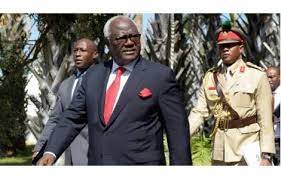It is five months since Sierra Leone’s beleaguered former president Ernest Bai Koroma flew to Nigeria after a court ruling which allowed him to leave on medical grounds.
The 70-year-old was the subject of interest from the authorities in Freetown who had charged him with a treasonous offense, an allegation he had strenuously denied.
A growing number of Sierra Leoneans are questioning the true reasons behind Koroma’s prolonged stay in Nigeria and the shroud of secrecy which attended to the events leading up to his departure.
Koroma left Sierra Leone in January after a court allowed him to travel abroad on medical grounds despite facing serious treason charges for an alleged role in a failed military coup last November.
During the investigations he was called in for questioning and apparently placed under house arrest.
Despite these serious allegations, the high court later ruled that he could leave the country temporarily to seek medical attention abroad.
He flew to Nigeria where he had kept a low profile ever since.
The court’s decision to allow him to leave had intensified political tensions within Sierra Leone, coming amid the contentious 2023 re-election of President Julius Maada Bio for a second term.
The main opposition candidate had rejected the election results, and international observers expressed concerns about the integrity of the vote.
Koroma’s legal team labeled the charges against him as “trumped up,” suggesting they are part of a broader political vendetta aimed at undermining him and his political allies.
They argue that the accusations lack substantial evidence and are intended to diminish Koroma’s influence.
Before Koroma’s departure, Dr. Omar Alieu Touray, President of the ECOWAS Commission, made two visits to Sierra Leone following the attempted coup of November 26th 2023. These visits have led to speculation that ECOWAS might have brokered an agreement with the Sierra Leonean authorities to facilitate Koroma’s quiet relocation into exile in Nigeria.
Adding to the mystery, the court adjourned the case as of March 6th to provide both parties with additional time to address the issues and ensure a fair legal process.
This adjournment has further delayed any definitive resolution of the situation, leaving many Sierra Leoneans uncertain and not knowing what to think.
Although others linked to November’s abortive coup are still behind bars, the Sierra Leone air is thick with uncertainty over what will become of the treason case when Koroma, one of the key suspects is not within its jurisdiction territorially.
As the legal proceeding dallies in the critical opinions of Sierra Leoneans, the debate over whether ex president Koroma is in Nigeria for medical reasons or as a form of political exile remains unsettled.
The situation continues to be closely watched, both within Sierra Leone and by international observers, as it carries significant implications for the country’s political stability and legal integrity.
ABJ/as/APA


